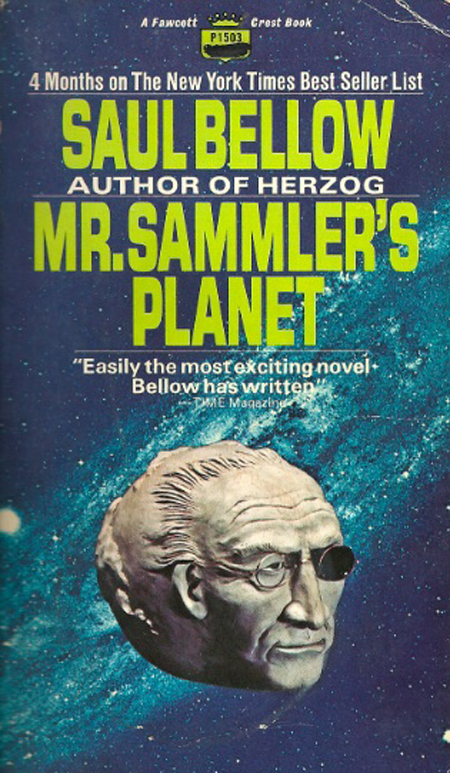
About the Author:
Saul Bellow, winner of the Nobel Prize for Literature in 1976, was born near Montreal in 1915 to Russian Jewish immigrant parents. He grew up in Chicago and as a young man taught at Princeton, New York University, University of Chicago and Boston University. In 1953, Bellow translated the Yiddish short story “Gimpel the Fool,” the first English translation of an Isaac Bashevis Singer story, thus introducing Singer to a global readership. Bellow’s early novels include Dangling Man (1944) and The Victim (1947). Three of his novels, The Adventures of Augie March (1953), Herzog (1964) and Mr. Sammler’s Planet (1970) won the National Book Award. Bellow died in Brookline, Massachusetts in April 2005.
About the Book:
Mr. Sammler’s Planet is the story of an elderly Holocaust survivor adrift in a sea of moral ambiguity and inconsistency in the turbulence of late 1960s New York. One day he witnesses a well-dressed pickpocket plying his trade; a series of interactions with the thief follow. His emotionally unstable daughter has stolen an important manuscript that was written by Sammler’s colleague, Dr. Govinda Lal, which explores establishing a utopian community on the Moon. Meanwhile, Dr. Elya Gruner, Sammler’s dear friend and emotional anchor, lies in a hospital, close to death.
Most of Mr. Sammler’s Planet comprises Sammler’s observations of the world—through his one good eye. Sammler is discouraged by the moral and intellectual decay he sees around him, and he struggles as his attempts to bridge the divide between himself and humanity.
Topics for Consideration and Discussion:
-
To what extent is Mr. Sammler’s Planet a Jewish book? Discuss Bellow’s responses to being called a Jewish writer. He has been quoted as saying: “I am Jewish. And I am a writer.” He described being labeled a “Jewish writer” as “a way of setting you aside.”
-
Why do you think that some critics have called Mr. Sammler’s Planet the least Jewish of Bellow’s writing? Is that a fair assessment?
-
How did the Holocaust shape Sammler’s view of the world? How might it have affected Bellow?
-
Critics have accused Bellow of using Mr. Sammler’s Planet to justify his own misogyny, racist and conservative values. How does Sammler embody these values? What are his attitudes about Black Power, Women’s Liberation and campus revolutions? Would you characterize Sammler’s values as similar to those of the author?
-
Like Gulliver’s Travels, the eighteenth century novel by Jonathan Swift, Mr. Sammler’s Planet portrays a man aimless in an alien culture. To what extent does Sammler personify the experience of Jews as the outsiders of the world?
-
Sammler’s “planet” is the Earth. Compare the way Bellow’s characters look both to our world and to the Moon as sources of hope and salvation. Discuss the Moon and Bellow’s representation of the author H.G. Wells in the novel as symbols of hope—false or realized.
-
What is Mr. Sammler’s morality? Is he a reactionary, as many critics have suggested? What is his position toward personal responsibility, moral relativism, authority and revolution?
-
Sammler’s experiences with the pickpocket are dramatic and dynamic. Discuss how Sammler interacts with the pickpocket at various points during the novel. Why does he behave as he does? Why does Sammler stop his son-in-law Eisen from assaulting the pickpocket?
-
Sammler is blind in one eye. How does Bellow use this blindness as a symbol for Sammler’s outlook on life?
-
The word “sammler” means “collector” in German. What does Mr. Sammler collect?
-
Examine the characters of Elya Gruner, Shula Sammler and the pickpocket. What is Sammler’s relationship with each? What does each character represent for Sammler and for the world constructed by Bellow?
-
The book ends with Sammler’s eulogy for his friend Elya. Reexamine the final paragraph of the book. What is Sammler saying about Elya and about his own role in the world? In what ways does this quiet speech, meant for no one but Sammler himself, serve to reconcile Sammler with God and with humanity?
-
In his speech given when accepting the 1965 National Book Award for Herzog, which may be found at www.nationalbook.org/nbaacceptspeech_sbellow.html, Bellow was critical of the alienation expressed in contemporary literature. “This estrangement,” he said, “though it produced some masterpieces, has by now enfeebled literature.” Despite the estrangement expressed by Sammler through most of the novel, does Bellow give some glimmer of hope, of reconciliation with humanity and the world in this book?
Further Reading:
Steve Steinbock is the author of several books published by the URJ Press, the most recent being These Words Upon My Heart, A Lexicon of Judaism and World Religions. Steve is a graduate of the HUC-JIR Rhea Hirsch School of Education in Los Angeles.

